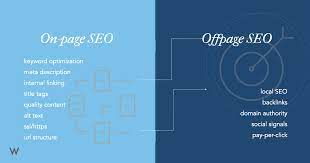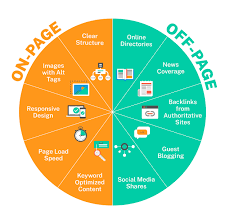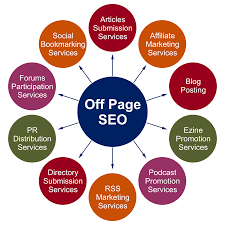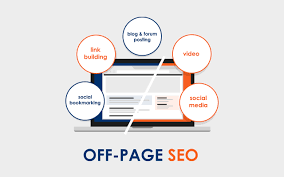Mastering On-Page and Off-Page SEO Strategies for Online Success
The Importance of On-Page and Off-Page SEO
Search Engine Optimization (SEO) is a vital component of any successful digital marketing strategy. It involves various techniques to enhance a website’s visibility on search engine results pages (SERPs). Two key aspects of SEO are on-page and off-page optimisation.
On-Page SEO
On-page SEO refers to the practices implemented directly on a website to improve its search engine ranking. This includes optimising content, meta tags, headings, images, and URLs. By focusing on on-page elements, businesses can make their websites more relevant to search engines and users.
Key elements of on-page SEO include:
- Keyword Optimisation: Researching and strategically placing relevant keywords throughout the content.
- Content Quality: Creating high-quality, engaging, and informative content that satisfies user intent.
- Title Tags and Meta Descriptions: Crafting compelling title tags and meta descriptions that encourage click-through rates.
- User Experience (UX): Ensuring the website is user-friendly, mobile-responsive, and easy to navigate.
Off-Page SEO
Off-page SEO focuses on activities conducted outside the website to improve its authority, relevance, and trustworthiness. This includes building backlinks from reputable websites, social media engagement, influencer partnerships, and online reputation management.
Key elements of off-page SEO include:
- Link Building: Acquiring quality backlinks from authoritative websites to boost a site’s credibility.
- Social Signals: Engaging with users on social media platforms to increase brand visibility and drive traffic.
- Online Reputation Management: Monitoring online reviews and mentions to maintain a positive brand image.
The Synergy Between On-Page and Off-Page SEO
To achieve optimal results in search engine rankings, businesses must integrate both on-page and off-page SEO strategies. While on-page optimisation lays the foundation for a strong website structure and content relevance, off-page efforts help establish authority and credibility in the eyes of search engines.
In conclusion, mastering both on-page and off-page SEO techniques is essential for enhancing online visibility, attracting organic traffic, and ultimately driving business growth in today’s competitive digital landscape.
7 Essential Tips for Mastering On-Page and Off-Page SEO
- Use descriptive URLs with relevant keywords
- Optimize images with alt text and proper file names
- Ensure mobile responsiveness for all devices
- Implement internal linking to improve site structure
- Build quality backlinks from authoritative websites
- Guest post on reputable blogs within your industry
- Monitor and manage online reviews and reputation
Use descriptive URLs with relevant keywords
In the realm of SEO, utilising descriptive URLs with pertinent keywords is a powerful strategy that can significantly enhance a website’s visibility and search engine ranking. By incorporating relevant keywords into the URL structure, businesses can provide search engines with valuable context about the content of the page, making it easier for both users and search engine crawlers to understand the purpose and relevance of the webpage. This simple yet effective practice not only boosts on-page SEO by improving keyword optimisation but also contributes to off-page SEO efforts through increased click-through rates and enhanced user experience.
Optimize images with alt text and proper file names
Optimising images with descriptive alt text and relevant file names is a crucial aspect of both on-page and off-page SEO strategies. By including alt text that accurately describes the image content and using meaningful file names that incorporate relevant keywords, websites can improve their accessibility, user experience, and search engine visibility. Alt text helps search engines understand the context of images, while optimised file names make it easier for search engine crawlers to index and rank visual content effectively. This simple yet effective practice not only enhances SEO performance but also contributes to overall website quality and user engagement.
Ensure mobile responsiveness for all devices
Ensuring mobile responsiveness for all devices is a crucial aspect of both on-page and off-page SEO strategies. With the increasing use of smartphones and tablets for browsing, search engines prioritise mobile-friendly websites in their rankings. By optimising your website to display seamlessly on various devices, you enhance user experience, reduce bounce rates, and improve overall site performance. This not only pleases search engines but also attracts and retains visitors, ultimately leading to higher organic traffic and better SEO results.
Implement internal linking to improve site structure
Implementing internal linking is a crucial strategy in both on-page and off-page SEO to enhance site structure. By strategically linking relevant pages within your website, you not only improve user navigation and experience but also help search engines understand the hierarchy and relationships between different pages. Internal linking distributes link equity throughout the site, boosting the authority of important pages and improving overall crawlability. This practice can also increase the time users spend on your site, reduce bounce rates, and ultimately contribute to higher search engine rankings.
Build quality backlinks from authoritative websites
Building quality backlinks from authoritative websites is a crucial aspect of off-page SEO. By acquiring backlinks from reputable and high-ranking sites, a website can enhance its credibility and authority in the eyes of search engines. These quality backlinks not only drive referral traffic but also signal to search engines that the site is a reliable source of information. This strategy helps improve the website’s visibility in search engine results pages (SERPs) and contributes to long-term organic growth.
Guest post on reputable blogs within your industry
Guest posting on reputable blogs within your industry is a powerful strategy that combines both on-page and off-page SEO benefits. By contributing high-quality content to industry-related blogs, you not only enhance your website’s authority and relevance through valuable backlinks (off-page SEO) but also showcase your expertise and build brand awareness (on-page SEO). This tactic not only drives targeted traffic to your site but also strengthens your online reputation and establishes trust with both search engines and potential customers. It’s a win-win approach that can significantly boost your search engine rankings and overall digital presence.
Monitor and manage online reviews and reputation
Monitoring and managing online reviews and reputation is a crucial aspect of off-page SEO strategy. By actively monitoring what customers are saying about your business online, you can address any negative feedback promptly and demonstrate a commitment to customer satisfaction. Positive reviews not only enhance your brand reputation but also contribute to building trust with potential customers. By engaging with online reviews and maintaining a positive brand image, you can strengthen your online presence and credibility, ultimately boosting your search engine rankings and driving organic traffic to your website.



